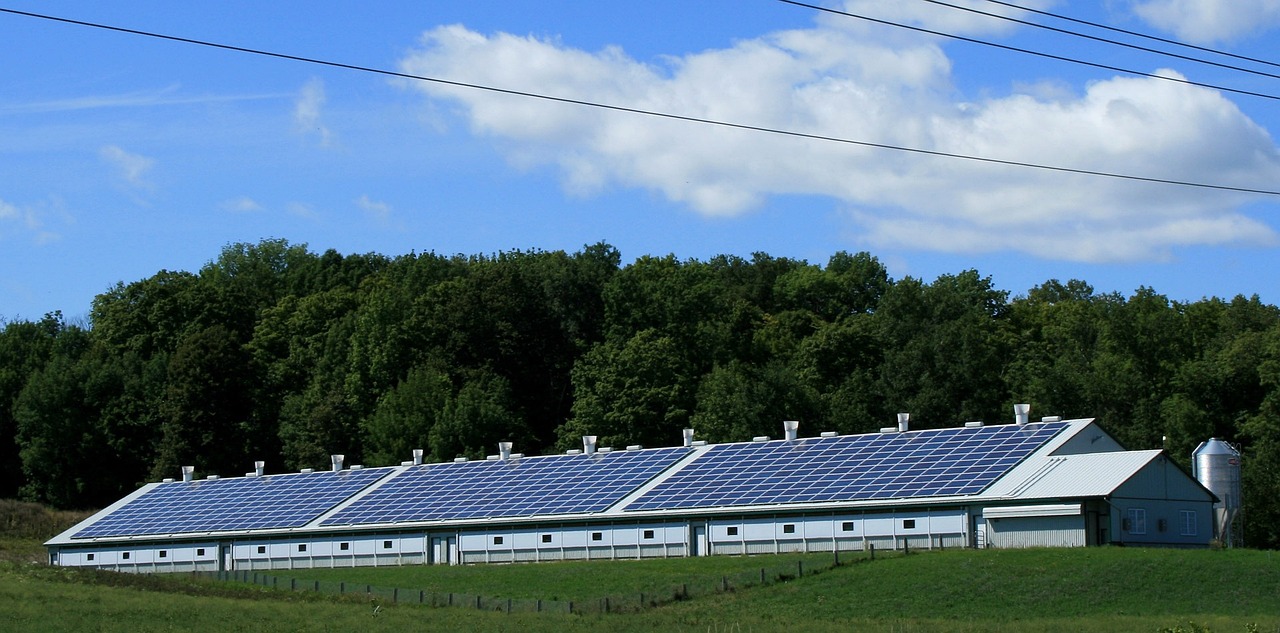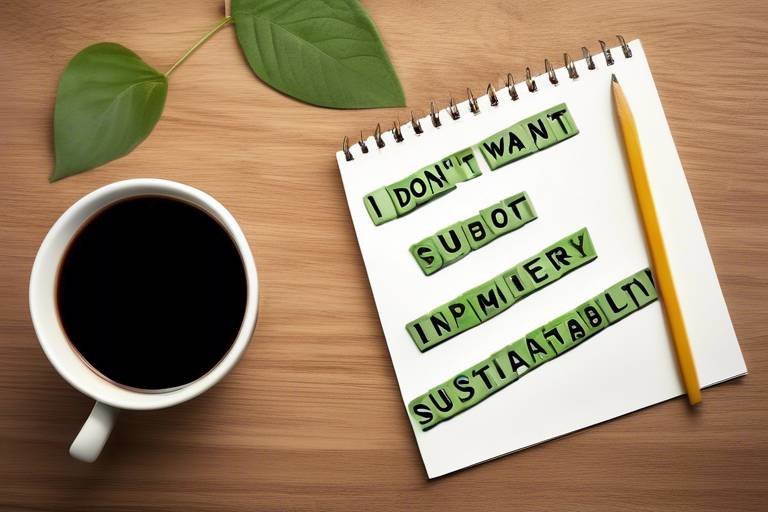10 Ways to Incorporate Sustainability into Your Career
Discover how you can make a positive impact on the environment and society through sustainable practices in your professional life.
Are you ready to take your career to the next level by integrating sustainability into your daily work routine? Incorporating sustainable practices into your professional life not only benefits the environment but also showcases your commitment to social responsibility. Let's explore ten impactful ways you can make a difference and contribute to a greener future through your career.
First and foremost, consider seeking employment opportunities with green employers who prioritize sustainability and environmental responsibility. Working for a company that values eco-friendly practices can significantly amplify your efforts in promoting a sustainable work environment.
Advocacy is key when it comes to driving change within your workplace. Advocate for change by encouraging the implementation of eco-friendly policies and initiatives that promote sustainability. Your voice matters, and your advocacy can inspire others to join the movement towards a greener workplace.
One of the simplest yet most effective ways to incorporate sustainability into your career is by reducing waste. Implement strategies such as recycling, composting, and minimizing paper usage in your daily tasks. Small changes can lead to significant reductions in waste production.
Consider telecommuting as a means to reduce your carbon footprint. Working from home or using public transportation not only decreases greenhouse gas emissions but also promotes a more flexible and sustainable work environment.
Embracing energy efficiency is another crucial aspect of sustainable practices in the workplace. Opt for energy-efficient appliances, lighting, and technology to minimize energy consumption and contribute to a greener planet.
Volunteering for sustainability projects in your community can provide hands-on experience and allow you to actively participate in environmental conservation efforts. Engaging in such initiatives not only benefits the environment but also enriches your professional development.
Continuous learning is essential in the journey towards sustainability. Stay informed about the latest sustainable practices and trends by attending workshops, webinars, and conferences focused on sustainability. Knowledge is power, and staying updated can help you drive positive change in your career.
Enhance your expertise and credibility by pursuing green certifications or qualifications in sustainability. These certifications not only validate your knowledge but also demonstrate your commitment to sustainable practices in your field.
Collaboration is key in the sustainability movement. Collaborate with like-minded professionals by joining sustainability networks and engaging with individuals who share your passion for creating a more sustainable future. Together, you can amplify your impact and drive meaningful change.
By incorporating these ten sustainable practices into your career, you can play a significant role in building a more environmentally conscious and socially responsible professional landscape. Take the first step towards a greener future today!

1. Choose Green Employers
When it comes to incorporating sustainability into your career, one of the most impactful ways is to choose green employers. By working for companies that prioritize sustainability and environmental responsibility in their operations, you can make a significant difference in the world while advancing your professional goals. Green employers are those organizations that actively seek to reduce their carbon footprint, minimize waste, and promote eco-friendly practices throughout their business activities.
When selecting a green employer, it's essential to research and evaluate their sustainability initiatives. Look for companies that have clear environmental policies, use renewable energy sources, and actively engage in conservation efforts. By aligning yourself with a green employer, you not only contribute to a more sustainable future but also demonstrate your commitment to environmental stewardship.
Moreover, working for a green employer can provide you with valuable opportunities to learn and grow in the sustainability field. You may have the chance to participate in green projects, attend eco-conscious events, and collaborate with like-minded professionals who share your passion for environmental sustainability. Choosing a green employer is not just a career decision but a personal commitment to making a positive impact on the planet.
Remember, the power to drive change towards a more sustainable future lies in the choices we make every day, including where we choose to work. By selecting a green employer, you are not only advancing your career but also contributing to a healthier planet for future generations.

2. Advocate for Change
Advocating for change within your workplace is a powerful way to drive sustainable practices forward. By actively promoting eco-friendly policies and initiatives, you can inspire positive transformations that benefit both the environment and the company's bottom line. Start by initiating conversations with colleagues and management about the importance of sustainability and the potential impact of implementing green strategies.
One effective approach is to gather data and case studies that highlight the benefits of sustainable practices, such as cost savings, improved brand reputation, and employee satisfaction. Presenting this information in a clear and compelling manner can help build a strong case for change and garner support from key stakeholders.
Collaborating with like-minded colleagues who share your passion for sustainability can amplify your advocacy efforts. By forming a green team or sustainability task force within your organization, you can work together to develop and implement initiatives that promote environmental responsibility.
Furthermore, engaging in open dialogue and seeking feedback from coworkers can foster a culture of sustainability within the workplace. Encouraging participation in green initiatives, such as waste reduction programs or energy-saving campaigns, can create a sense of shared responsibility and drive collective action towards a more sustainable future.
Remember, advocating for change is not just about raising awareness; it's also about taking concrete steps to drive progress. By actively championing sustainable practices and influencing positive change within your workplace, you can make a significant impact on the organization's environmental footprint and contribute to a more sustainable future for all.

3. Reduce Waste
Discover how you can make a positive impact on the environment and society through sustainable practices in your professional life.
In today's world, where environmental concerns are at the forefront, reducing waste has become a crucial aspect of sustainability. By implementing waste reduction strategies in your daily work routine, you can significantly contribute to a greener future. One effective way to reduce waste is by incorporating recycling practices into your workplace. Setting up designated recycling bins for paper, plastic, and other materials can help divert waste from landfills and promote a more eco-friendly environment.
Another practical approach to waste reduction is composting organic waste. By composting food scraps and other biodegradable materials, you can create nutrient-rich soil that can be used for gardening or landscaping purposes. This not only reduces the amount of waste sent to landfills but also contributes to sustainable agriculture practices.
Furthermore, reducing paper usage is a simple yet impactful way to minimize waste in the workplace. Encouraging digital documentation, utilizing electronic communication, and printing only when necessary can significantly decrease paper waste. Additionally, opting for recycled or sustainably sourced paper products can further enhance your waste reduction efforts.
By embracing waste reduction strategies such as recycling, composting, and minimizing paper usage, you can play a vital role in promoting sustainability within your career and making a positive impact on the environment.
Q: How can I encourage my colleagues to participate in waste reduction efforts?
A: You can organize awareness campaigns, workshops, or training sessions to educate your colleagues about the importance of waste reduction and the benefits it brings to the environment. Setting a positive example through your own practices can also inspire others to join in.
Q: What are some innovative ways to repurpose waste materials in the workplace?
A: Consider implementing upcycling projects where waste materials are transformed into new and useful items. For example, old office supplies can be repurposed into creative decorations or functional storage solutions, reducing waste while fostering creativity.

4. Telecommute
Telecommuting, also known as remote work, is a sustainable practice that allows employees to work from home or any location outside of the traditional office setting. By telecommuting, individuals can significantly reduce their carbon footprint by eliminating the need for daily commuting to and from work. This not only helps in reducing greenhouse gas emissions but also contributes to a healthier environment.
Moreover, telecommuting promotes a better work-life balance, as it eliminates the stress and time-consuming aspects of daily commuting. By working from home, employees can save time, money, and energy that would otherwise be spent on transportation. This flexibility allows individuals to focus more on their work tasks and productivity, leading to a more efficient work environment.
Employers also benefit from telecommuting arrangements as they can reduce overhead costs associated with maintaining a physical office space. Additionally, telecommuting can lead to increased employee satisfaction and retention, as it provides flexibility and autonomy in managing work schedules.
With the advancement of technology, telecommuting has become more accessible and efficient than ever before. Video conferencing, project management tools, and cloud-based software enable seamless communication and collaboration among remote teams. This shift towards remote work not only benefits individuals and organizations but also plays a significant role in promoting sustainability in the workplace.

5. Embrace Energy Efficiency
Embracing energy efficiency in your professional life is not only beneficial for the environment but also for your overall productivity and cost savings. By opting for energy-efficient appliances, lighting, and technology in your workplace, you can significantly reduce energy consumption and contribute to a greener future. Imagine the impact of a single energy-efficient light bulb in a room, illuminating the space with brightness while consuming minimal electricity compared to traditional bulbs. This simple switch not only saves energy but also sets an example for others to follow.
Moreover, embracing energy efficiency goes beyond just using energy-efficient products. It involves creating a culture of sustainability within your workplace, where employees are conscious of their energy usage and actively seek ways to minimize wastage. Picture a workspace where everyone is mindful of turning off lights when leaving a room, unplugging devices not in use, and utilizing natural light whenever possible. These small yet impactful actions collectively contribute to a significant reduction in energy consumption and carbon emissions.
Additionally, implementing energy-efficient practices can lead to long-term cost savings for businesses. By investing in energy-efficient technologies and solutions, companies can lower their utility bills, improve operational efficiency, and enhance their reputation as environmentally responsible organizations. Consider the analogy of a leaky faucet - fixing it may require an initial investment, but in the long run, it saves water and prevents unnecessary wastage.
Furthermore, embracing energy efficiency in your career can inspire others within your workplace to follow suit. By demonstrating the benefits of energy-efficient practices through your own actions, you can motivate colleagues to adopt similar behaviors and contribute to a more sustainable work environment. Imagine the ripple effect of one individual's commitment to energy efficiency spreading throughout an entire organization, creating a collective effort towards a greener future.

6. Volunteer for Sustainability Projects
Volunteering for sustainability projects is a fantastic way to actively contribute to environmental conservation and make a tangible impact on your community. By dedicating your time and effort to such initiatives, you not only support important causes but also raise awareness and inspire others to join in the movement towards a more sustainable future.
Engaging in sustainability-focused volunteer work allows you to participate in hands-on projects that address pressing environmental issues, such as tree planting, beach cleanups, or sustainable agriculture initiatives. These experiences not only benefit the planet but also provide you with valuable skills and insights that can enhance your professional development.
Furthermore, volunteering for sustainability projects offers a unique opportunity to connect with like-minded individuals who share your passion for environmental stewardship. Collaborating with such individuals can lead to meaningful relationships, new perspectives, and potential career opportunities within the sustainability sector.
Consider joining local environmental organizations or non-profits that specialize in sustainability projects to explore a wide range of volunteer opportunities. Whether you are interested in wildlife conservation, renewable energy advocacy, or sustainable urban planning, there are numerous ways to get involved and make a difference.
Remember, every small action counts when it comes to promoting sustainability. By volunteering for sustainability projects, you not only contribute to positive change but also inspire others to take proactive steps towards a greener and more sustainable future.

7. Continuous Learning
Continuous learning is a vital aspect of incorporating sustainability into your career. By staying informed about sustainable practices and trends, you can adapt to the ever-evolving landscape of environmental responsibility. Attending workshops, webinars, and conferences related to sustainability allows you to expand your knowledge and network with like-minded professionals. It's like planting seeds of knowledge that grow into a forest of sustainable practices in your professional life.

8. Green Certification
When it comes to incorporating sustainability into your career, obtaining a Green Certification can be a significant step towards enhancing your knowledge and credibility in the field. Green certifications are credentials that demonstrate your expertise and commitment to sustainable practices, making you a valuable asset in the workforce.
These certifications cover a wide range of topics such as renewable energy, resource conservation, waste management, and sustainable development. By pursuing a Green Certification, you not only expand your skill set but also show potential employers your dedication to environmental responsibility.
One popular certification is the Leadership in Energy and Environmental Design (LEED) certification, which focuses on green building and construction practices. This certification is highly regarded in the architecture and construction industries, providing professionals with the knowledge to design and construct environmentally friendly buildings.
Another valuable certification is the Certified Sustainability Professional (CSP) designation, which is ideal for individuals looking to specialize in sustainability management and corporate social responsibility. This certification equips professionals with the tools to implement sustainable practices within organizations and drive positive change.
Obtaining a Green Certification not only benefits your career but also contributes to the larger goal of creating a more sustainable future. By staying informed about the latest trends and best practices in sustainability, you can become a leader in promoting environmental stewardship in your industry.

9. Collaborate with Like-Minded Professionals
Collaborating with like-minded professionals who share your passion for sustainability can amplify your impact and create a more significant change in the world. By joining sustainability networks, you can connect with individuals who are dedicated to creating a greener future and exchange ideas, resources, and support. Working together with others who have similar goals can inspire innovation and foster a sense of community in your efforts towards sustainability.
Through collaboration, you can leverage the diverse skills and expertise of different professionals to address complex sustainability challenges effectively. By pooling resources and knowledge, you can tackle larger projects and initiatives that might be beyond your individual capacity. Additionally, collaborating with like-minded professionals can provide opportunities for mentorship, learning, and personal growth as you navigate the evolving landscape of sustainability practices.
Engaging in collaborative projects with others who are passionate about sustainability can also help you expand your network and build valuable relationships within the industry. These connections can lead to new opportunities, partnerships, and collaborations that further advance your career and impact in the sustainability field. By surrounding yourself with a supportive community of like-minded professionals, you can stay motivated, inspired, and informed as you work towards a more sustainable future.
Frequently Asked Questions
- What are the benefits of incorporating sustainability into my career?
By incorporating sustainability into your career, you contribute to a healthier environment, support social responsibility, and enhance your professional reputation. It also allows you to align your values with your work, making a positive impact on the world.
- How can I find green employers to work for?
You can research companies that prioritize sustainability through their corporate social responsibility reports, websites, and job postings. Look for certifications like B Corp or awards for environmental stewardship to identify green employers.
- What steps can I take to reduce waste in the workplace?
You can reduce waste by implementing recycling programs, using digital documents instead of paper, encouraging reusable items, and promoting a culture of sustainability among your colleagues.
- Why is continuous learning important for sustainability?
Continuous learning allows you to stay updated on the latest sustainable practices, technologies, and trends. It helps you adapt to changing environmental challenges and positions you as a knowledgeable leader in the sustainability field.


















